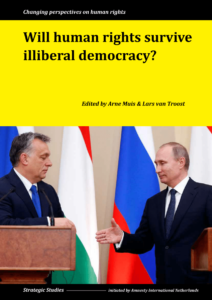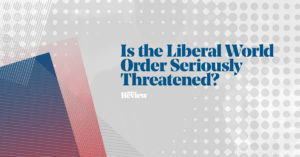The sprawl of contemporary liberal values—from LGBTQ rights to gender equality to the rights of migrants—invites pushback in both democratic and nondemocratic states. It provides illiberal politicians with opportunities to isolate specific liberal values and use them as wedge issues against their opponents, note analysts Alexander Cooley and Daniel H. Nexon, Director of Columbia University’s Harriman Institute and Professor in Georgetown University’s Walsh School of Foreign Service, respectively:
There is nothing particularly novel about this kind of strategy. What is notable is how it has become transnational and, in so doing, has served as a basis for illiberal policies in other countries. Such wedge strategies are also used to undermine support in the international community for reformers by tying them to illiberal values.
 In advancing liberal rights, policymakers have to navigate significant tradeoffs, inconsistencies, and contention. This extends beyond matters of democracy promotion and civil rights, they write in The Real Crisis of Global Order: Illiberalism on the Rise, an essay for Foreign Affairs.
In advancing liberal rights, policymakers have to navigate significant tradeoffs, inconsistencies, and contention. This extends beyond matters of democracy promotion and civil rights, they write in The Real Crisis of Global Order: Illiberalism on the Rise, an essay for Foreign Affairs.
Authoritarian regimes and their apologists claim that the West has instrumentalized human rights for geo-political advantage.
“The role of democracy and human rights in international security began its decay when an inclusive security architecture was abandoned,” claimed a contributor to the 18th Annual meeting of the pro-Putin Valdai Discussion Club. “Hegemonic ambitions were translated into the creation a Europe without Russia, which was to be organised by an expanding NATO and EU. Liberalism subsequently became a hegemonic norm.”
Laszlo Magas, a retired professor who helped bring an end to communism in Hungary, chalks up his country’s political isolation to one thing: Western liberal bias. Europe, he says, is ideologically divided between the conservative East and the more liberal West, something like red-and-blue America, NPR reports.
“Hungary is not the West’s colony,” says Magas, an Orbán supporter who echoes many of the prime minister’s views. “The whole world is being misled about us. The mainstream media is full of fake news about us. The liberals want you to think Hungary doesn’t know what democracy is because we don’t share their beliefs.”

National Endowment for Democracy (NED)
When populists come to power, they tend to infringe upon the rule of law, the independence of the courts and the media, and the rights of individuals and minorities, as has been the case in Hungary, noted Marc F. Plattner. Moreover, these illiberal aspects of populism had begun to surface not just in countries lacking a liberal tradition but even in longstanding Western democracies, he wrote for The Journal of Democracy.
Nation-states have proven to be the single most effective vehicle for realizing the right of all peoples to self-determination, and for protecting individual rights and freedoms. Liberal values are for the most part unable to thrive once they are plucked from the soil of national identification, argues Gadi Taub, the author of The Rise of Antidemocratic Liberalism: Israel, the United States, and the West. Until internationalists find some other way to bridge the gap between their global ambitions and the democratic rights of citizens, we who believe that government derives its just powers from the consent of the governed would do well to keep our distance, he writes for The Tablet.
 Liberal rights–based states enjoy a competitive edge over authoritarian regimes in the modern era because the path to human rights entails transitioning from a social order grounded in patronage and favoritism to one dedicated to equal treatment under impersonal rules, Jack Snyder writes in the forthcoming Human Rights for Pragmatists: Social Power in Modern Times. But rights advocates should embrace a tailored strategy that acknowledges local power structures and cultural practices.
Liberal rights–based states enjoy a competitive edge over authoritarian regimes in the modern era because the path to human rights entails transitioning from a social order grounded in patronage and favoritism to one dedicated to equal treatment under impersonal rules, Jack Snyder writes in the forthcoming Human Rights for Pragmatists: Social Power in Modern Times. But rights advocates should embrace a tailored strategy that acknowledges local power structures and cultural practices.
Central European University’s Professor Michael Ignatieff explores the reasons behind the rise of illiberal democracy in Eastern Europe and why universities are among the targets of these illiberal regimes (above).
Liberal internationalism lacks the tools to deal with current threats, he writes for Persuasion. Liberal activism’s characteristic response—human rights “naming and shaming”—became irrelevant as authoritarians grew shameless, consolidating their grip within global powers like Russia and China, as well as smaller players like Turkey and Venezuela.
We can curb hubris and repent of the tacit moral imperialism of many liberal impulses to set the world to rights, without forgetting that how a regime treats its own people is a predictor of the threat it poses internationally, Ignatieff adds.
The rise of illiberal and populist parties in government in the last decade is a key explanatory factor in democratic backsliding and decline, according to the latest IDEA Global State of Democracy report.
 But many Western liberals “are running the risk of a serious conceptual error, mistaking the powerful new resistance to today’s globalizing but faltering neoliberal order for an attack on the foundations of political democracy,” argues James Poulous, the author of The Art of Being Free (St. Martin’s, 2017). “Rather than hoping or striving to destroy democratic government, the new nationalism on the right is focused on disempowering features of the liberal order that, as many liberals proudly admit, diminish the power and prestige of national politics,” he writes for Foreign Affairs.
But many Western liberals “are running the risk of a serious conceptual error, mistaking the powerful new resistance to today’s globalizing but faltering neoliberal order for an attack on the foundations of political democracy,” argues James Poulous, the author of The Art of Being Free (St. Martin’s, 2017). “Rather than hoping or striving to destroy democratic government, the new nationalism on the right is focused on disempowering features of the liberal order that, as many liberals proudly admit, diminish the power and prestige of national politics,” he writes for Foreign Affairs.
Neither of the historical routes to the ideological victory of liberalism seems likely, Cooley and Nexon conclude. This means that liberal democracies really do need to assume that they will not retake the catbird seat of the international order anytime soon. And so the question becomes not whether the liberal order will change but on whose terms. RTWT







